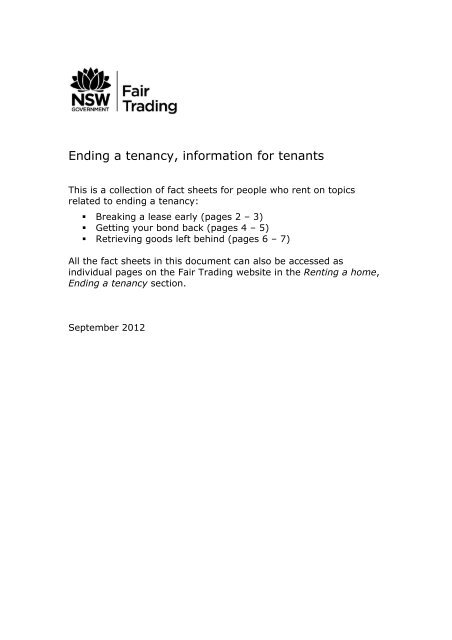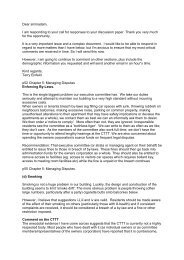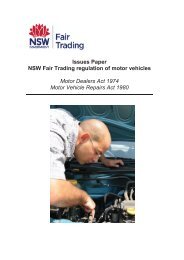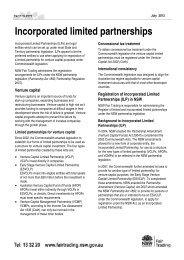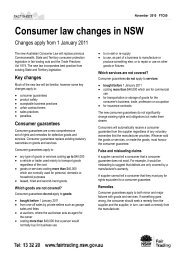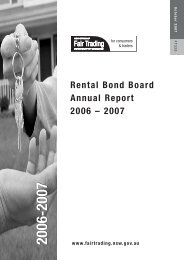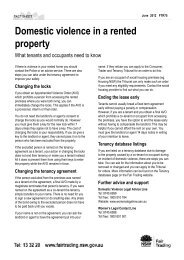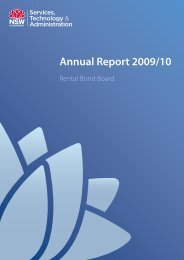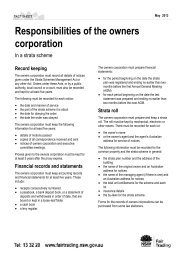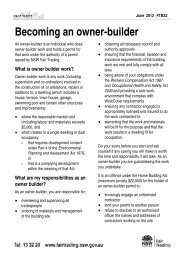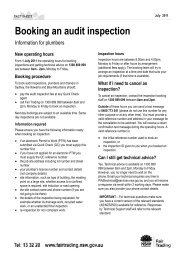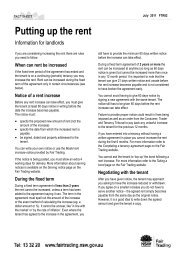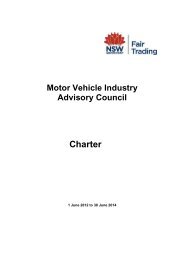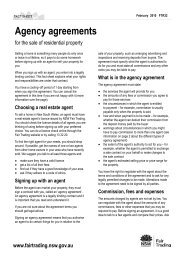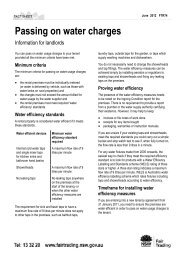Ending a tenancy - information for tenants (in PDF - NSW Fair Trading
Ending a tenancy - information for tenants (in PDF - NSW Fair Trading
Ending a tenancy - information for tenants (in PDF - NSW Fair Trading
You also want an ePaper? Increase the reach of your titles
YUMPU automatically turns print PDFs into web optimized ePapers that Google loves.
<strong>End<strong>in</strong>g</strong> a <strong>tenancy</strong>, <strong><strong>in</strong><strong>for</strong>mation</strong> <strong>for</strong> <strong>tenants</strong><br />
This is a collection of fact sheets <strong>for</strong> people who rent on topics<br />
related to end<strong>in</strong>g a <strong>tenancy</strong>:<br />
Break<strong>in</strong>g a lease early (pages 2 – 3)<br />
Gett<strong>in</strong>g your bond back (pages 4 – 5)<br />
Retriev<strong>in</strong>g goods left beh<strong>in</strong>d (pages 6 – 7)<br />
All the fact sheets <strong>in</strong> this document can also be accessed as<br />
<strong>in</strong>dividual pages on the <strong>Fair</strong> Trad<strong>in</strong>g website <strong>in</strong> the Rent<strong>in</strong>g a home,<br />
<strong>End<strong>in</strong>g</strong> a <strong>tenancy</strong> section.<br />
September 2012
Break<strong>in</strong>g a lease early<br />
In<strong>for</strong>mation <strong>for</strong> <strong>tenants</strong><br />
When you sign a fixed term <strong>tenancy</strong> agreement (lease)<br />
you are committ<strong>in</strong>g to stay <strong>for</strong> the full term. If your<br />
circumstances change and you want to move out be<strong>for</strong>e<br />
the end of the fixed term there are potential costs<br />
<strong>in</strong>volved. There are some circumstances where a fixed<br />
term agreement can be term<strong>in</strong>ated early without penalty.<br />
Refer to the section ‘Break<strong>in</strong>g the agreement without<br />
penalty’ below.<br />
Costs you may have to pay<br />
Break<strong>in</strong>g your <strong>tenancy</strong> agreement dur<strong>in</strong>g the fixed term<br />
can be costly. You may have to pay:<br />
● rent until a new tenant takes over or the fixed term<br />
period ends, whichever occurs first, and<br />
● a percentage of the advertis<strong>in</strong>g costs and the agent's<br />
relett<strong>in</strong>g fee (if the landlord uses an agent). For<br />
example, if you break the lease 9 months <strong>in</strong>to<br />
a 12‑month <strong>tenancy</strong> there is 25% of the lease<br />
rema<strong>in</strong><strong>in</strong>g, so you would expect to pay 25% of these<br />
amounts.<br />
If you need to end your agreement early you should give<br />
as much notice as you can. The landlord or agent must<br />
take all reasonable steps to f<strong>in</strong>d a replacement tenant<br />
as soon as possible. The more you can do to help, the<br />
less you may have to pay. You should make it as easy as<br />
possible <strong>for</strong> the landlord or agent to show the premises to<br />
potential new <strong>tenants</strong>.<br />
If you are concerned that it is tak<strong>in</strong>g a long time to f<strong>in</strong>d<br />
a new tenant, you can check that the landlord or agent<br />
is try<strong>in</strong>g to relet the property. Check the agent's website<br />
and their list of available rental properties.<br />
The landlord and agent must try to keep your costs to<br />
a m<strong>in</strong>imum. For example, if they do anyth<strong>in</strong>g to make it<br />
harder to f<strong>in</strong>d a new tenant (such as ask<strong>in</strong>g <strong>for</strong> a higher<br />
rent or unreasonably reject<strong>in</strong>g potential <strong>tenants</strong>) you may<br />
not have to pay the full amount they are ask<strong>in</strong>g.<br />
Once the new tenant is found the landlord or agent will<br />
request payment <strong>for</strong> the amount you owe. If you don't<br />
September 2012 FTR78<br />
pay or if you disagree with the amount, the landlord or<br />
agent will usually claim from your bond or apply to the<br />
Consumer, Trader and Tenancy Tribunal. Be aware that<br />
if you owe more money than the bond your name could<br />
be listed on a <strong>tenancy</strong> database. Such list<strong>in</strong>gs can make<br />
it difficult to rent aga<strong>in</strong> anywhere <strong>in</strong> Australia.<br />
Optional break fee<br />
You and the landlord can agree to <strong>in</strong>clude a break fee<br />
clause <strong>in</strong> the additional terms of your <strong>tenancy</strong> agreement.<br />
The break fee is a penalty you agree to pay if you move<br />
out be<strong>for</strong>e the end of the fixed term.<br />
If the fixed term of the agreement is <strong>for</strong> 3 years or less<br />
the break fee is:<br />
● 6 weeks rent if you move out <strong>in</strong> the first half of the<br />
fixed term<br />
● 4 weeks rent if you move out <strong>in</strong> the second half of the<br />
fixed term.<br />
If the fixed term is <strong>for</strong> more than 3 years and you and the<br />
landlord agree to <strong>in</strong>clude a break fee clause, you can<br />
agree on the amount and write it <strong>in</strong>to the agreement.<br />
Where there is a break fee <strong>in</strong> your agreement that is all<br />
you have to pay if you move out early. However, if the<br />
landlord or agent f<strong>in</strong>d a new tenant quickly it does not<br />
mean that you will get any of the break fee back. It is a<br />
fixed fee.<br />
Breach by the landlord<br />
If your landlord is not comply<strong>in</strong>g with the terms of your<br />
<strong>tenancy</strong> agreement you may be able to end your lease<br />
early without penalty, <strong>for</strong> example, if the landlord is fail<strong>in</strong>g<br />
to keep the premises <strong>in</strong> reasonable repair.<br />
If you th<strong>in</strong>k the breach is serious enough to justify end<strong>in</strong>g<br />
the <strong>tenancy</strong>, you can give 14 days written term<strong>in</strong>ation<br />
notice to the landlord. If they disagree they can apply to<br />
the Tribunal.
Alternatively, you can apply to the Tribunal without giv<strong>in</strong>g<br />
notice. You will need to take evidence to satisfy the<br />
Tribunal that the breach justifies end<strong>in</strong>g the agreement.<br />
The Tribunal can refuse to make an order if the landlord<br />
remedies the breach. If you had already moved out, you<br />
may have to pay the costs of break<strong>in</strong>g the lease.<br />
Break<strong>in</strong>g the agreement without<br />
penalty<br />
In limited circumstances you can break the agreement<br />
early without penalty. You can give 14 days written notice<br />
to end an agreement early if:<br />
● you have accepted an offer of social hous<strong>in</strong>g (eg.<br />
from Hous<strong>in</strong>g <strong>NSW</strong>)<br />
● you need to move <strong>in</strong>to an aged care facility or<br />
nurs<strong>in</strong>g home (not a retirement village)<br />
● you have obta<strong>in</strong>ed a f<strong>in</strong>al apprehended violence<br />
order aga<strong>in</strong>st somebody you were liv<strong>in</strong>g with that<br />
excludes them from the property<br />
● the landlord has put the premises on the market <strong>for</strong><br />
sale, and you were not told be<strong>for</strong>e sign<strong>in</strong>g the lease<br />
that the property would be sold.<br />
You can give 21 days written notice to end an agreement<br />
early if:<br />
● you have a fixed term agreement of more than 2<br />
years and you have been given a rent <strong>in</strong>crease<br />
notice or<br />
● your co‑tenant passes away.<br />
If you give notice <strong>for</strong> any of these reasons you are able<br />
to end the agreement early without hav<strong>in</strong>g to pay any<br />
compensation or other costs to the landlord. You are only<br />
liable <strong>for</strong> the rent until your notice ends and you hand<br />
back possession of the premises.<br />
Mutual consent<br />
Any <strong>tenancy</strong> agreement can be ended at any time if the<br />
landlord and tenant mutually agree.<br />
www.fairtrad<strong>in</strong>g.nsw.gov.au<br />
<strong>Fair</strong> Trad<strong>in</strong>g enquiries 13 32 20<br />
TTY 1300 723 404<br />
Language assistance 13 14 50<br />
This fact sheet must not be relied<br />
on as legal advice. For more<br />
<strong><strong>in</strong><strong>for</strong>mation</strong> about this topic, refer to<br />
the appropriate legislation.<br />
Hardship<br />
September 2012 FTR78<br />
If it would cause you undue hardship to stay <strong>in</strong> the<br />
premises until the end of the fixed term you can apply to<br />
the Tribunal to end the agreement early. You can ask <strong>for</strong><br />
an urgent hear<strong>in</strong>g but will need to keep pay<strong>in</strong>g the rent.<br />
You will need to satisfy the Tribunal that special<br />
circumstances exist which were not <strong>in</strong> place when you<br />
first moved <strong>in</strong> and that your hardship is severe or serious.<br />
If the Tribunal agrees that your <strong>tenancy</strong> can end early it<br />
may order you to compensate the landlord <strong>for</strong> lost rent<br />
and other losses.<br />
© State of New South Wales through <strong>NSW</strong> <strong>Fair</strong> Trad<strong>in</strong>g<br />
You may freely copy, distribute, display or download this <strong><strong>in</strong><strong>for</strong>mation</strong> with<br />
some important restrictions. See <strong>NSW</strong> <strong>Fair</strong> Trad<strong>in</strong>g's copyright policy at<br />
www.fairtrad<strong>in</strong>g.nsw.gov.au or email publications@services.nsw.gov.au
Gett<strong>in</strong>g your bond back<br />
In<strong>for</strong>mation <strong>for</strong> <strong>tenants</strong><br />
If you do not owe the landlord or agent money at the<br />
end of your <strong>tenancy</strong>, the bond that you paid at the<br />
beg<strong>in</strong>n<strong>in</strong>g of your <strong>tenancy</strong> should be refunded to you <strong>in</strong><br />
full. However, if the landlord or agent believes you owe<br />
them money, they are able to make a claim aga<strong>in</strong>st your<br />
bond.<br />
Refund by agreement<br />
Be<strong>for</strong>e you leave and hand back the keys you should<br />
contact the agent or landlord to arrange a mutually<br />
agreeable time to do the f<strong>in</strong>al <strong>in</strong>spection. This is where<br />
you both go over the property to see if there is any<br />
damage or anyth<strong>in</strong>g which needs clean<strong>in</strong>g. If they raise<br />
someth<strong>in</strong>g that is m<strong>in</strong>or you may be able to deal with<br />
it on the spot. The official condition report needs to be<br />
completed at this <strong>in</strong>spection.<br />
If you agree with the agent or landlord on how the bond<br />
is to be paid out ask them to fill out and sign a Claim <strong>for</strong><br />
Refund of Bond Money <strong>for</strong>m and give it to you so you<br />
can lodge it with <strong>Fair</strong> Trad<strong>in</strong>g. This way, the bond can be<br />
paid out straight away.<br />
Never sign a blank Claim <strong>for</strong> Refund of Bond Money<br />
<strong>for</strong>m. Always make sure the bond refund amounts are<br />
filled <strong>in</strong> be<strong>for</strong>e you sign the <strong>for</strong>m.<br />
If you disagree<br />
If you cannot agree with the agent or landlord about<br />
how the bond should be paid out, or if you feel that they<br />
are tak<strong>in</strong>g too long, you can lodge a Claim <strong>for</strong> Refund<br />
of Bond Money <strong>for</strong>m yourself without their signature on<br />
it. This will start the ball roll<strong>in</strong>g but the bond will not be<br />
released immediately. <strong>Fair</strong> Trad<strong>in</strong>g will post a notice to<br />
the agent or landlord giv<strong>in</strong>g them 14 days <strong>in</strong> which to<br />
contest your claim by apply<strong>in</strong>g to the Consumer, Trader<br />
and Tenancy Tribunal. If they do not apply with<strong>in</strong> the 14<br />
days, the bond will then be paid out as per your claim. If<br />
they apply to the Tribunal the bond will be held by <strong>Fair</strong><br />
Trad<strong>in</strong>g until the dispute is settled. The landlord or agent<br />
will need to attend a hear<strong>in</strong>g at the Tribunal and present<br />
March 2012 FTR79<br />
evidence to back up their claim. You will receive a notice<br />
from the Tribunal if they apply. You should also attend the<br />
hear<strong>in</strong>g and br<strong>in</strong>g evidence to support your claim.<br />
Challeng<strong>in</strong>g a landlord's claim<br />
If the landlord or agent lodges a claim first, without your<br />
signature, <strong>Fair</strong> Trad<strong>in</strong>g will send you notice giv<strong>in</strong>g you<br />
14 days <strong>in</strong> which to contest the claim. You can contact<br />
the agent or landlord and try to get them to change their<br />
m<strong>in</strong>d and lodge a new claim <strong>for</strong>m signed by both of you.<br />
If that is unsuccessful your only option is to apply to the<br />
Tribunal with<strong>in</strong> the 14 days, otherwise the bond will be<br />
paid out as per the landlord's claim. Make sure to notify<br />
<strong>Fair</strong> Trad<strong>in</strong>g that you have applied, by call<strong>in</strong>g 13 32 20 or<br />
by one of the methods set out <strong>in</strong> the notice of claim.<br />
With<strong>in</strong> 7 days of lodg<strong>in</strong>g the claim they must send you<br />
copies of the f<strong>in</strong>al <strong>in</strong>spection report, along with any<br />
estimates, quotes, <strong>in</strong>voices or receipts relat<strong>in</strong>g to the<br />
claim. If they fail to do this you should raise it at the<br />
Tribunal hear<strong>in</strong>g. You should also tell the Tribunal if you<br />
were not given a reasonable opportunity to be present<br />
at the f<strong>in</strong>al <strong>in</strong>spection, and if you disagree with what was<br />
written <strong>in</strong> the f<strong>in</strong>al condition report. You should also show<br />
any evidence you have to support your position.<br />
Claim by your landlord<br />
The ma<strong>in</strong> reasons a claim may be lodged aga<strong>in</strong>st your<br />
bond are:<br />
● if you still owe any rent or have unpaid water usage<br />
bills<br />
● if you broke the lease early and haven't paid the<br />
break fee or other compensation payable<br />
● if you didn't hand all the copies of the keys you were<br />
given and the locks needed to be changed<br />
● if you caused damage or didn’t leave the premises<br />
<strong>in</strong> a reasonably clean condition, compared to the<br />
orig<strong>in</strong>al condition report, apart from normal fair wear<br />
and tear.
This is not an exhaustive list. There may be other<br />
legitimate reasons <strong>for</strong> the landlord or agent to make a<br />
claim aga<strong>in</strong>st your bond, such as the cost of dispos<strong>in</strong>g of<br />
goods you have left beh<strong>in</strong>d.<br />
<strong>Fair</strong> wear and tear<br />
As expla<strong>in</strong>ed above, you are not responsible <strong>for</strong> fair wear<br />
and tear to the premises. <strong>Fair</strong> wear and tear means the<br />
deterioration that occurs over time with the use of the<br />
premises even though the premises receive reasonable<br />
care and ma<strong>in</strong>tenance. Such deterioration could be<br />
caused by exposure, time or just by ord<strong>in</strong>ary use. You<br />
are only liable <strong>for</strong> negligent, irresponsible or <strong>in</strong>tentional<br />
actions that cause damage to the premises. These<br />
examples may help to expla<strong>in</strong> the difference.<br />
<strong>Fair</strong> wear and tear – you<br />
are not liable<br />
Faded curta<strong>in</strong>s or frayed<br />
cords<br />
Furniture <strong>in</strong>dentations and<br />
traffic marks on the carpet<br />
www.fairtrad<strong>in</strong>g.nsw.gov.au<br />
<strong>Fair</strong> Trad<strong>in</strong>g enquiries 13 32 20<br />
TTY 1300 723 404<br />
Language assistance 13 14 50<br />
Damage – you are liable<br />
Miss<strong>in</strong>g curta<strong>in</strong>s or torn by<br />
the tenant's cat<br />
Sta<strong>in</strong>s or burn marks on<br />
the carpet<br />
Scuffed up wooden floors Badly scratched or<br />
gouged wooden floors<br />
Faded, chipped or<br />
cracked pa<strong>in</strong>t<br />
Unapproved pa<strong>in</strong>t job<br />
Worn kitchen bench top Burns or cuts <strong>in</strong> bench top<br />
Loose h<strong>in</strong>ges or handles<br />
on doors or w<strong>in</strong>dows and<br />
worn slid<strong>in</strong>g tracks<br />
Cracks <strong>in</strong> the walls from<br />
movement<br />
Broken glass from one of<br />
your children hitt<strong>in</strong>g a ball<br />
through the w<strong>in</strong>dow<br />
Holes <strong>in</strong> walls left by<br />
tenant remov<strong>in</strong>g picture<br />
hooks or shelves they had<br />
<strong>in</strong>stalled<br />
This fact sheet must not be relied<br />
on as legal advice. For more<br />
<strong><strong>in</strong><strong>for</strong>mation</strong> about this topic, refer to<br />
the appropriate legislation.<br />
Water sta<strong>in</strong> on carpet from<br />
ra<strong>in</strong> through leak<strong>in</strong>g roof<br />
or bad plumb<strong>in</strong>g<br />
Interest payable<br />
March 2012 FTR79<br />
Water sta<strong>in</strong> on carpet<br />
caused by overflow<strong>in</strong>g<br />
bath or <strong>in</strong>door pot plants<br />
A small amount of <strong>in</strong>terest will be paid to you when you<br />
get your bond back. The majority of the <strong>in</strong>come earned<br />
from the collective pool of rental bonds is used to fund<br />
a range of services that benefit all <strong>tenants</strong>, such as<br />
fund<strong>in</strong>g the Consumer, Trader and Tenancy Tribunal<br />
and organisations across New South Wales under the<br />
Tenants Advice and Advocacy Program.<br />
© State of New South Wales through <strong>NSW</strong> <strong>Fair</strong> Trad<strong>in</strong>g<br />
You may freely copy, distribute, display or download this <strong><strong>in</strong><strong>for</strong>mation</strong> with<br />
some important restrictions. See <strong>NSW</strong> <strong>Fair</strong> Trad<strong>in</strong>g's copyright policy at<br />
www.fairtrad<strong>in</strong>g.nsw.gov.au or email publications@services.nsw.gov.au
Retriev<strong>in</strong>g goods left beh<strong>in</strong>d<br />
In<strong>for</strong>mation <strong>for</strong> <strong>tenants</strong><br />
If you move out or are evicted from your rental property<br />
and you leave beh<strong>in</strong>d some of your goods or personal<br />
documents the law sets out how the landlord or agent<br />
can deal with them and how you can get them back.<br />
You should contact the landlord or agent as soon as<br />
you can. That way, there is less risk that your goods<br />
or personal documents will be damaged, removed or<br />
disposed of. The sooner you collect the items the less<br />
you may have to pay to cover storage costs.<br />
Rubbish and perishable items<br />
If you leave any rubbish or perishable items on the<br />
property, the landlord or agent may dispose of them<br />
immediately. For example, a broken chair and a pile of<br />
old newspapers or perishable food left <strong>in</strong> a cupboard and<br />
dy<strong>in</strong>g pot plants <strong>in</strong> the yard. They do not have to notify<br />
you or get your consent to dispose of such items.<br />
Notice required<br />
If you have left items other than rubbish beh<strong>in</strong>d (goods of<br />
value) the landlord or agent must attempt to notify you.<br />
They need to try to contact you and let you know that<br />
they have your goods and will dispose of them after a<br />
certa<strong>in</strong> time if you do not collect them. The landlord or<br />
agent can do this <strong>in</strong> writ<strong>in</strong>g (to your <strong>for</strong>ward<strong>in</strong>g address<br />
if they have it, or to the rental property <strong>in</strong> case you have<br />
arranged <strong>for</strong> your mail to be redirected), <strong>in</strong> person or over<br />
the telephone. If after 2 days the landlord or agent has<br />
not been able to contact you, they are able to leave a<br />
notice on the premises (eg. stuck to the front door).<br />
Goods of value<br />
Goods of value could <strong>in</strong>clude such th<strong>in</strong>gs as furniture,<br />
electrical items and cloth<strong>in</strong>g. If you have left goods<br />
beh<strong>in</strong>d of this nature, the landlord or agent needs to store<br />
them <strong>in</strong> a safe place. This could be on the premises or<br />
somewhere else. They are only required to keep these<br />
goods <strong>for</strong> 14 days from the day they notify you to come<br />
and collect them.<br />
Personal documents<br />
February 2012<br />
Different rules are <strong>in</strong> place when deal<strong>in</strong>g with your<br />
personal documents. Personal documents are def<strong>in</strong>ed<br />
under the Act as be<strong>in</strong>g:<br />
● a birth certificate, passport or other identity document<br />
● bank books or other f<strong>in</strong>ancial statements or<br />
documents<br />
● photographs and other personal memorabilia (eg.<br />
medals and trophies)<br />
● licences or other documents conferr<strong>in</strong>g authorities,<br />
rights or qualifications.<br />
The landlord or agent should keep personal documents<br />
left beh<strong>in</strong>d <strong>in</strong> a safe place <strong>for</strong> at least 90 days from the<br />
day they give you notice.<br />
Reclaim<strong>in</strong>g your goods and<br />
documents<br />
You, or anybody else with a legal <strong>in</strong>terest <strong>in</strong> the goods<br />
(eg. your ex‑housemate or a goods hire company)<br />
can reclaim the goods at any time they rema<strong>in</strong> <strong>in</strong> the<br />
landlord or agent's possession. A suitable time and day<br />
<strong>for</strong> collection needs to be agreed upon. The landlord or<br />
agent cannot refuse to return your belong<strong>in</strong>gs, even if<br />
you owe rent or money <strong>for</strong> some other reason.<br />
You may have to pay an occupation fee to cover storage<br />
expenses if sufficient goods were left beh<strong>in</strong>d to prevent<br />
the landlord or agent rent<strong>in</strong>g the premises to somebody<br />
else.<br />
An occupation fee equal to a day's rent can be charged<br />
<strong>for</strong> each day the goods are held, whether they are stored<br />
on the premises or elsewhere. However, only a maximum<br />
of 14 days occupation fee can be charged even if the<br />
goods are held <strong>for</strong> longer.
Disposal of unclaimed items<br />
If you fail to reclaim your goods of value with<strong>in</strong> the 14<br />
days, the landlord or agent may dispose of them <strong>in</strong> any of<br />
the follow<strong>in</strong>g ways:<br />
● donat<strong>in</strong>g the goods to charity (e.g. leav<strong>in</strong>g clothes<br />
<strong>in</strong> a cloth<strong>in</strong>g b<strong>in</strong> or arrang<strong>in</strong>g <strong>for</strong> furniture etc to be<br />
collected)<br />
● dispos<strong>in</strong>g of the goods <strong>in</strong> a lawful manner (e.g. tak<strong>in</strong>g<br />
them to the tip or organis<strong>in</strong>g a council collection)<br />
● keep<strong>in</strong>g the goods <strong>in</strong> the property if they are useful<br />
fixtures and fitt<strong>in</strong>gs (e.g. curta<strong>in</strong>s)<br />
● sell<strong>in</strong>g the goods <strong>for</strong> fair value and giv<strong>in</strong>g the<br />
proceeds to you (less any occupation fee and<br />
the reasonable costs of the sale).<br />
Unclaimed personal documents can be disposed of after<br />
the 90 days <strong>in</strong> an appropriate manner, such as by be<strong>in</strong>g<br />
returned to the issu<strong>in</strong>g authority (wherever possible), or<br />
shredded.<br />
Resolv<strong>in</strong>g disputes<br />
If the law is correctly followed there is no action you<br />
can take aga<strong>in</strong>st the landlord if your goods or personal<br />
documents have been donated, disposed of or sold.<br />
However, if the law is not followed you may seek<br />
compensation from the landlord or agent through the<br />
Tribunal <strong>for</strong> any losses.<br />
If the landlord or agent refuses to return goods or<br />
personal documents, you can apply to the Tribunal <strong>for</strong> an<br />
order that the items be returned to you.<br />
If your goods have been sold and the proceeds of the<br />
sale have not been passed on to you an application can<br />
be made to the Tribunal.<br />
www.fairtrad<strong>in</strong>g.nsw.gov.au<br />
<strong>Fair</strong> Trad<strong>in</strong>g enquiries 13 32 20<br />
TTY 1300 723 404<br />
Language assistance 13 14 50<br />
This fact sheet must not be relied<br />
on as legal advice. For more<br />
<strong><strong>in</strong><strong>for</strong>mation</strong> about this topic, refer to<br />
the appropriate legislation.<br />
February 2012<br />
© State of New South Wales through <strong>NSW</strong> <strong>Fair</strong> Trad<strong>in</strong>g<br />
You may freely copy, distribute, display or download this <strong><strong>in</strong><strong>for</strong>mation</strong> with<br />
some important restrictions. See <strong>NSW</strong> <strong>Fair</strong> Trad<strong>in</strong>g's copyright policy at<br />
www.fairtrad<strong>in</strong>g.nsw.gov.au or email publications@services.nsw.gov.au


